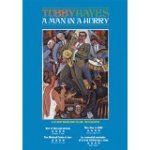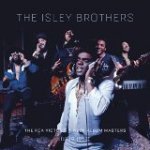It’s time to get the High Fives under way for 2015 and, in a break with tradition, I’m handing over the opening slot to one of our guests, Neil Sheasby, bass player and co-songwriter with one of The Riot Squad’s favourite bands, Stone Foundation. The band have had a great year with the release of their superb album “A Life Unlimited” (guest vocal from Graham Parker, no less), a Japanese tour and some high profile UK gigs. Neil’s observations on music are always interesting, so it’s a pleasure to let him have the first High Five this year.
 KAMASI WASHINGTON – “THE EPIC”
KAMASI WASHINGTON – “THE EPIC”
A record that pretty much defined my summer, for a few weeks I didn’t play much else. It is actually one of those albums that the more you listen to it, the more it will give you in return. It’s quite a sprawling, challenging recording set over three discs and clocking in at around three hours so it’s hard to digest all in one sitting but its depth, beauty and sheer ambition is unlike any other album I have heard in recent times. It could easily sit alongside the jazz heavyweights such as Coltrane’s output for impulse & Atlantic. Probably more accessible though. It has a timeless quality to it and an underlying spiritual vibe, funky too. I was lucky enough to catch his recent London gig and the playing was just on another level, astonishing stuff. Inspiring. He also led me to Kendrick Lamar’s “To Pimp a Butterfly” album (Kamasi plays on it) which is a great modern hip hop record again pushing & re-defining the boundaries of that particular genre.
I think 2015 has been a strong year for new releases and new music in general, it’s been encouraging.I’ve really enjoyed new albums from artists I hadn’t previously heard of like Ryley Walker whose “Primrose Green” album evokes traces of John Martyn & Tim Buckley; also the Julia Holter record is an interesting listen but I must admit the real surprises of the year have lain with the rejuvenation of established arists that have made really unexpected returns to former glories. New Order’s “Music Complete” album was a real eye opener, easily their best since 1989’s Technique. It’s a real triumph; Peter Hook free too! They should be proud of such a complete piece of work after all these years, it was a bona fide pleasant surprise to my ears, I’d about written them off.
Also this year there’s been great new albums from Joe Jackson (“Fast Forward) and Squeeze (“Cradle to the Grave”) that are fit to stand alongside any of their previous highlights.
This is a film about the relatively short life of British Jazz genius Tubby Hayes. It was made by two good friends of mine, Mark Baxter & Lee Cogswell and it’s a fascinating profile and made with much affection for its subject, narrated by Martin Freeman and it includes commentary & interviews with Sir Peter Blake, Spike Wells, Robert Elms, Simon Spillett and Ed Piller amongst others. I’ve known Mark for several years now and from day one he always had a burning desire to create a fitting documentary as a testament to Tubby’s life & music, he’s more than succeeded, I’m so pleased for him & Lee. It’s a fantastic little film and one that had me running for the records again.
Me and a mate recently attended the London launch party for its DVD release and on the train home it had us talking passionately about London & the Soho jazz scenes through the years, the clothes and the clubs, the DJ’s, bands, singers etc.That’s the tell-tale sign that “A Man in a Hurry” film had served its purpose all right.
Released earlier this year The RCA Victor and T-Neck albums all housed together in a 22 CD box set. It spans the Isleys career from 1959 up to 1983 taking in all those classic mid 70’s albums as well as a previously unreleased live album recorded at Bearsville Sound Studios. It’s an absolute beauty and really highlights the often overlooked genius of The Isley Brothers. Ronald, Ernie and Rudolph began with Doo-wop roots and evolved marvellously through classic Soul, Funk and even disco
It’s an incredible collection, once I get immersed in it, I’m in there for days on end. Brilliant stuff.
 YOU KNOW MY NAME: THE LOVERS, THE DREAMERS AND BOBBY SCOTT
YOU KNOW MY NAME: THE LOVERS, THE DREAMERS AND BOBBY SCOTT
A compelling & fascinating read by one of my favourite writers, Kevin Pearce. It’s actually the first book I have ever read from start to finish on my phone, it was my companion whilst on holiday this summer. Not many will be familiar with the name of Bobby Scott but it’s probably safe to say that you would have certainly heard his work.
Bobby composed, arranged, sang, produced and performed with countless artists including Marvin Gaye, Bobby Darin, Timi Yuro, Aretha Franklin, Chet Baker, Quincy Jones, Roland Kirk, Deodato, Stan Getz, Astrud Gilberto and a cast of thousands more. Bobby Scott songs include “A Taste of Honey”, recorded by the Beatles, and the epic “He ain’t Heavy, He’s my Brother” which The Hollies struck gold with (also check Donny Hathaway’s miraculous version) The only downer to reading this book is that it will seriously have you running back and forth to You Tube checking out song after song and of course in my case, being a hopeless music junkie, I ended up spending a small fortune on chasing up some of these spectacular sounds for my ever expanding collection.
I also read great autobiographies from Robert Wyatt, Bernard Sumner, Nile Rodgers, and somewhat refreshingly the Italian footballer Pirlo. I was a tad disappointed with the Grace Jones book, thought it would be more telling I think, then again Paul Morley was involved so no surprise I was underwhelmed.
I’m just about to begin Elvis Costello’s “Unfaithful music and Disappearing Ink”; looking forward to it…..
Every year there are hundreds of music-related books published, mainly biographies or autobiographies and they range from the very serious to the completely frivolous and from very well written to ‘see me after school’. These might not all have been published in 2014, but they were all on this year’s reading list. These books are all highly recommended if you’re interested at all in the background to the tunes you listen to or bands you go to watch, or even if you just want scurrilous anecdotes about sex and drugs. I’m making no attempt to rank these because they’re all so different, so, in no particular order:
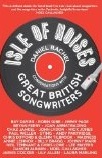 “Isle of Noises” – Daniel Rachel
“Isle of Noises” – Daniel Rachel
This is the serious one. It’s a series of interviews with famous (mostly) British songwriters which explores the ways in which songwriters work. It’s incredibly well researched (even some of the artists point that out) and obviously a labour of love for Daniel Rachel; if you have any interest at all in how songs are written, this is a great read. Don’t expect to discover the perfect songwriting method because you discover very early on that everybody writes differently. The writers being interviewed cover a wide range of styles ranging from the Sixties to the present day, so the scope of the project is enormous. Every time I meet someone who’s read it, we compare notes about which songwriter comes over as the most pretentious.
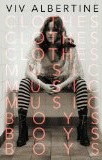 “Clothes, Clothes, Clothes, Music, Music, Music, Boys, Boys, Boys” – Viv Albertine
“Clothes, Clothes, Clothes, Music, Music, Music, Boys, Boys, Boys” – Viv Albertine
The stories from the punk era alone would make this worth reading (guitarist in The Slits, friend of Sid Vicious and girlfriend of Mick Jones) and there are plenty of tales of bad behaviour, but the latter part of the book tells us much more about Viv Albertine and her struggles to have a baby, to beat cancer, to survive a failing marriage and to take up guitar again and re-invent herself as a solo artist (her album “The Vermilion Border” was released in 2012). If you need confirmation of the entrenched sexist attitudes of the music and publishing businesses, you’ll find it here.
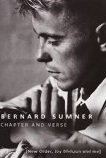 “Chapter and Verse” – Bernard Sumner
“Chapter and Verse” – Bernard Sumner
It’s difficult to see this as anything other than attempt to address some of the claims made by Peter Hook in his two books, but Bernard obviously feels hurt by some of the things that have been said and wants to let the public hear his (and New Order’s) version. The terse prose style is a stark contrast with Hooky’s “man-down-the-pub” delivery; there’s no grandstanding and a lot of self-deprecation in this memoir. Bernard seems to have a genuine affection for his ex-bandmate (and friend) and the over-riding impression the book leaves is of puzzlement at Hooky’s recent actions. The only jarring note is the inclusion of a transcript of a hypnosis experiment with Ian Curtis; I’m not sure why it happened in the first place, and I’m not sure why it was published. Other than that, a good read.
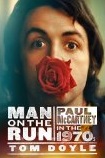 “Man on the Run – Paul McCartney in the 70s” – Tom Doyle
“Man on the Run – Paul McCartney in the 70s” – Tom Doyle
Tom Doyle has correctly identified a gap in the market for a book dealing with Paul McCartney’s immediate post-Beatles life (Peter Doggett’s “You Never Give me Your Money” focusses on the financial shenanigans of the period and the breakup of the relationship with John Lennon) and, perhaps surprisingly, he got Macca’s full co-operation with the project. Although there are some anecdotes which are excruciatingly embarrassing for the subject, there’s still a nagging little doubt that he’s manipulating the project at times. What the book clearly shows is that during that period, Paul McCartney’s decision-making was inconsistent and sometimes bizarre (trying to take a huge amount of dope into Japan, for example) and that he has a need to control situations and these two things, singly or combined, are the cause of most of the incidents covered. It’s a fascinating read, although it’s still not clear whether he’s man running away from or towards something.
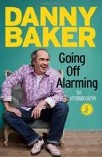 “Going off Alarming” – Danny Baker
“Going off Alarming” – Danny Baker
This is the second volume of Danny Baker’s memoirs and, unsurprisingly, the written Danny Baker sounds very much like the radio and TV Danny Baker. He uses the preface to explain why he won’t be writing a misery memoir and the introduction to explain the reason for the wonky chronology between the two books (after the first book was published, friends and family reminded him of stories he’d left out, including being shot up the arse in Bermondsey). It’s a romp through the crazy world of Danny Baker up to the point where he was sacked from “Pets Win Prizes” and is full of hilarious, mainly self-deprecatory anecdotes about his domestic and professional life. There are some genuine laugh-out-loud moments and it entertains throughout.
Ok, call me obsessive if you like but as well as listening to a lot of albums and going to as many gigs as I can, I also read the odd book or two about music and popular culture and many of those are worth sharing with anyone who checks out MusicRiot regularly. This list was difficult to pin down to five from the start, but it became even more difficult on Christmas Day when I was given a copy of the Donald Fagen memoir/tour diary/article compilation, “Eminent Hipsters”. So I guess that’s a pretty good place to start.
“Eminent Hipsters” – Donald Fagen
 Where do I start with Donald Fagen? With Walter Becker, he was half of one of my favourite 70s bands, Steely Dan and then went on to release the classic solo album, “The Nightfly” in 1982, followed (not too closely) by “The Kamakiriad” in 1993. You’ve probably guessed by now, I’m a bit of a fan. “Eminent Hipsters” is partly an explanation, through a series of articles, of the factors which influenced the Steely Dan sound (cool jazz, cop dramas and wise-ass comedians) and the Donald Fagen solo sound (science fiction and mid-century paranoia). If you love the music, you’ll be fascinated by these observations about its roots. The second part of this slim volume is devoted to Fagen’s diary from the 2012 “Dukes of September Rhythm Revue” tour which is, by turn, snarky, moving, insightful and downright hilarious.
Where do I start with Donald Fagen? With Walter Becker, he was half of one of my favourite 70s bands, Steely Dan and then went on to release the classic solo album, “The Nightfly” in 1982, followed (not too closely) by “The Kamakiriad” in 1993. You’ve probably guessed by now, I’m a bit of a fan. “Eminent Hipsters” is partly an explanation, through a series of articles, of the factors which influenced the Steely Dan sound (cool jazz, cop dramas and wise-ass comedians) and the Donald Fagen solo sound (science fiction and mid-century paranoia). If you love the music, you’ll be fascinated by these observations about its roots. The second part of this slim volume is devoted to Fagen’s diary from the 2012 “Dukes of September Rhythm Revue” tour which is, by turn, snarky, moving, insightful and downright hilarious.
Donald Fagen writes in an instantly-identifiable style betraying a debt to Raymond Chandler and Dashiell Hammett, which sneaks in when describing Audrey Hepburn in “Breakfast at Tiffany’s” as getting :”out of that cab on Fifth Avenue in a black dress and pearls in the early morning, I wanted to sip her through a straw”. It’s beautifully written and you can get through it in a few hours; it takes 170 pages to deliver a message that most rock biographies take at least five times as long to get over.
“Bedsit Disco Queen: How I Grew Up and Tried to be a Pop Star” – Tracey Thorn
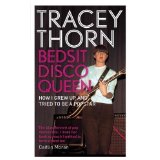 If Donald Fagen’s prose style is easily identifiable, then Tracey Thorn’s is even more so. I’m always impressed when musicians get this right (Peter Hook and Luke Haines also do it particularly well) and, from the first paragraph, this is pitch-perfect ‘Popstar Trace’. The book takes us from the Marine Girls beginnings through the EBTG false starts and eventual success to the beautiful Massive Attack vocals (I’m biased, but you should read about the origins of the modern classic, “Protection” here) and the worldwide Todd Terry-remixed success of “Missing”.
If Donald Fagen’s prose style is easily identifiable, then Tracey Thorn’s is even more so. I’m always impressed when musicians get this right (Peter Hook and Luke Haines also do it particularly well) and, from the first paragraph, this is pitch-perfect ‘Popstar Trace’. The book takes us from the Marine Girls beginnings through the EBTG false starts and eventual success to the beautiful Massive Attack vocals (I’m biased, but you should read about the origins of the modern classic, “Protection” here) and the worldwide Todd Terry-remixed success of “Missing”.
Tracey’s style is perfectly self-deprecatory; you never feel a hint of false modesty and the mentions of famous musicians are always very matter-of-fact, including the story about waiting to pick the kids up from school and being shouted at by George Michael from a Range Rover. This is a wonderful memoir from a genuine pop star.
“Yeah, Yeah, Yeah: The Story of Modern Pop” – Bob Stanley
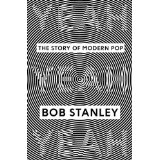 It’s obvious from the outset that this is actually a companion piece to the classic 2012 St Etienne album, “Words and Music”. The album was a voyage through the history of British pop music and the book is an extended verbal remix of the ground covered by the album. What’s equally obvious is that Bob Stanley is both an enthusiast and an insider, which gives him a unique perspective on his subject. He aims to show the links between different styles using not just the music, but also sociological and technological developments. If you’re interested in the history of pop music and you’ve done a bit of research, you might disagree with some of his pronouncements, but it’s a big book and you’ll probably agree with ninety per cent of them.
It’s obvious from the outset that this is actually a companion piece to the classic 2012 St Etienne album, “Words and Music”. The album was a voyage through the history of British pop music and the book is an extended verbal remix of the ground covered by the album. What’s equally obvious is that Bob Stanley is both an enthusiast and an insider, which gives him a unique perspective on his subject. He aims to show the links between different styles using not just the music, but also sociological and technological developments. If you’re interested in the history of pop music and you’ve done a bit of research, you might disagree with some of his pronouncements, but it’s a big book and you’ll probably agree with ninety per cent of them.
The book takes the first NME chart in 1952 as its starting point (which is logical and not controversial) and the end of vinyl as a chart force in 1993 as its end point, when the first Number One singles not to have been released as a 7” single or (a few months later) on vinyl at all topped the charts (if you want to know what they are, you can buy the book ). It’s a slightly more controversial choice but still with a logical basis for someone who grew up in the age of vinyl. The book has an authority derived from Bob Stanley’s experience as a writer and member of a very successful pop group but never slips into the socio-cultural academic approach of, for example, Simon Reynolds. The theme that underpins everything else in this book is that Bob Stanley is still a fan who wants you to come round and listen to his records, and that makes this an unmissable book.
“Here Comes Everybody: The Story of the Pogues” – James Fearnley
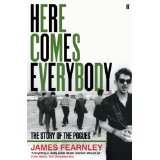 I’ve always been a fan of the “inside story” biography, particularly those that aren’t ghost-written attempts at cultural revisionism. This memoir by James Fearnley is, at times, brutally and crushingly honest about members of The Pogues and he doesn’t spare himself either. The book begins by setting the scene with Shane MacGowan’s departure from the band in 1991 before moving back to Fearnley’s initial meeting with MacGowan at an audition for The Nips in 1980.
I’ve always been a fan of the “inside story” biography, particularly those that aren’t ghost-written attempts at cultural revisionism. This memoir by James Fearnley is, at times, brutally and crushingly honest about members of The Pogues and he doesn’t spare himself either. The book begins by setting the scene with Shane MacGowan’s departure from the band in 1991 before moving back to Fearnley’s initial meeting with MacGowan at an audition for The Nips in 1980.
The book is a (mainly) unsentimental account of the rise and fall of The Pogues from the viewpoint of someone close enough to see everything but with enough distance to retain some objectivity. From the chaotic managerless beginnings through the unpopular but successful stewardship of Frank Murray, the story is underpinned at all times by MacGowan’s unpredictability and seemingly random self-destructive urges. James Fearnley tries very hard to balance the singer’s inexcusable behaviour against the genius of the songs, but it’s up to you if you buy that line; I certainly don’t. My only criticism is that James Fearnley spends a little too much time trying to emphasise the fact that he’s a writer and occasionally introduces unnecessarily florid prose to prove it; putting that aside, it’s still a winner.
“Sounds like London: 100 Years of Black Music in the Capital” – Lloyd Bradley
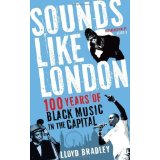 Bear with me for a minute here; this will all make sense presently. Earlier this year I read “How Soon is Now?: The Madmen and the Mavericks who made Independent Music 1975-2005” by Richard King. It’s a very good book and a must for geeks like us, but it attracted a lot of criticism because it didn’t touch on the black music scene. Richard King was even accused, pathetically, of racism in some quarters; you might even have read about it. Personally, I prefer to read authors who write about subjects they understand and that really inspire them; if Richard King didn’t have the expertise, contacts or inspiration to write about the black music scene, then Lloyd Bradley certainly did.
Bear with me for a minute here; this will all make sense presently. Earlier this year I read “How Soon is Now?: The Madmen and the Mavericks who made Independent Music 1975-2005” by Richard King. It’s a very good book and a must for geeks like us, but it attracted a lot of criticism because it didn’t touch on the black music scene. Richard King was even accused, pathetically, of racism in some quarters; you might even have read about it. Personally, I prefer to read authors who write about subjects they understand and that really inspire them; if Richard King didn’t have the expertise, contacts or inspiration to write about the black music scene, then Lloyd Bradley certainly did.
The title is a little misleading; there’s very little about pre-1950s black music, and it also deals with regional English offshoots from the London scene but those aren’t criticisms, just observations. The reason for the comparison with Richard King’s book is that one of Lloyd Bradley’s recurring themes is that black British music has always developed and prospered healthily out of the mainstream when produced and distributed independently.
Once the book reaches the point where Lloyd Bradley can introduce interviews with the players who made black British music happen (the steel pan players, the jazzers, the sound system pioneers, the Britfunk players and the mainstream crossovers Eddy Grant, Janet Kay, Jazzie B and the rest), the narrative really takes off with stories of the sound systems and records being sold out of the back of a car and distributed around the country in the same way. Lloyd Bradley takes us through calypso, ska, reggae, lovers rock, dub, britfunk, 98 bpm, trip hop, jungle, d’n’b, UK garage, dubstep and grime along with a host of short-lived one-way streets with an unassuming and easy authority that is very seductive. If you want an introduction to black British music, this is the book for you.
OK, spoilers alert; I’ve relented. I’ll tell you that the chart-toppers Bob Stanley refers to in 1993 and 1995 respectively are Culture Beat’s “Mr Vain” and Celine Dion’s “Think Twice”, but you should still read the book. Actually you should read all of these books.
 You should have realised by now that I would get the last word on this one. We’ve had some varied and interesting selections from our regular team and from several guest contributors. Many thanks for that to Billy Ray Martin, Dean Owens, Lilygun, Skye Edwards and Steve Jenner. As well as all of the great music we’ve highlighted on MusicRiot, we’ve also seen a great selection of books about music and music-related subjects so, in no particular order, here are my favourites from 2012.
You should have realised by now that I would get the last word on this one. We’ve had some varied and interesting selections from our regular team and from several guest contributors. Many thanks for that to Billy Ray Martin, Dean Owens, Lilygun, Skye Edwards and Steve Jenner. As well as all of the great music we’ve highlighted on MusicRiot, we’ve also seen a great selection of books about music and music-related subjects so, in no particular order, here are my favourites from 2012.
“Going to Sea in a Sieve” – Danny Baker
I realise that Danny Baker is a bit like Marmite: he tends to provoke strong reactions. If you already like Danny Baker, this is a must; his writing style is very conversational and he has some wonderful stories to tell from a career stretching over 40 years in the music and media industries. The real beauty of the book is that none of the anecdotes seem to be overplayed; if anything, he seems to play down stories of meetings with Elton John, pre-success Queen (which is hilarious) and Michael Jackson. I’m already looking forward to the next volume.
“Mind the Bollocks” – Johnny Sharp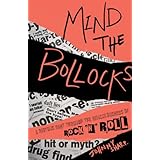
There’s a link to the previous book here; both were written by ex-NME writers, but that’s where the similarity ends. Here, Johnny Sharp (who wrote for the NME as Johnny Cigarettes) skewers pretension, hype and plain drug-induced nonsense in a book that’s absolutely overflowing with schadenfreude. As a counterbalance to stabbing his former colleagues in the back, he’s not afraid of exposing himself to ridicule where it’s deserved, which adds to the overall credibility of the book. Interestingly, one of the so-called facts torn apart by Sharp was the article from “The Word” in 2010 claiming that the charts were now dominated by stars who had been privately educated. It’s ironic that Billy Bragg used this so-called fact in his John Peel lecture for 6 Music recently.
“Pulphead: Dispatches from the Other Side of America” – John Jeremiah Sullivan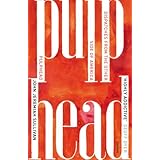
This is a fascinating series of essays which are mainly, but not exclusively, observations on some of the more interesting nooks and crannies of popular music including perceptive pieces on Christian Rock festivals, Michael Jackson and Axl Rose. Moving away from music, Sullivan discourses on reality TV, how he dealt with his brother almost dying of an electric shock, smoking weed in Disneyland and rogue palaeontologists and anthropologists. His point of view is always more or less skewed and always entertaining.
“Unknown Pleasures:Inside Joy Division” – Peter Hook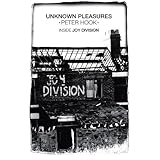
Having read Hooky’s first volume of memoirs “The Haçienda: How Not to Run a Club”, this was always one to add to the library. Hooky, like Danny Baker, writes in a very conversational style and is incredibly honest about his own mistakes, particularly in the events leading up to the suicide of Ian Curtis. When he isn’t dealing with tragedy, however, he’s hilarious in a very readable, self-deprecatory style. I’m already looking forward to the next instalment dealing with New Order.
“Waging Heavy Peace: A Hippy Dream” – Neil Young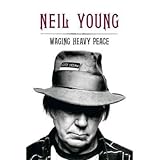
OK, I admit it; I’m a Neil Young fan. I read the Jimmy McDonough biography, “Shakey”, which Young didn’t authorise but didn’t actively obstruct but left it feeling slightly let down, so the idea of an autobiography grabbed my interest from the start. The experience of reading the book is a bit like a Neil Young guitar solo; you never know where it’s going next, but you know it’s going to be interesting. He intersperses autobiographical material with enthusiastic promotion of the various technology projects which he’s developing, including the Lionel model railway, the environmentally friendly Lincvolt car and the Pono high quality music player. In an age of jaded superstars, it’s great to hear someone being enthusiastic about his projects and constantly reiterating his love for family and friends. You finish this book feeling that you actually know something about Neil Young and that’s the mark of a good biography for me.
All of these books are worth reading if you want to know a little more about what lies behind the music and the headlines from the viewpoint of people who were actually involved. You might also want to have a look at Carole King’s “Natural Born Woman” and Pat Long’s “The History of The NME”.
Have a great New Year.



